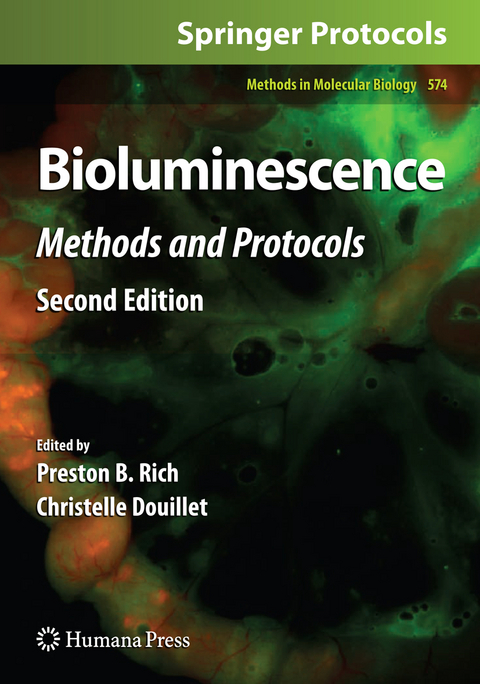
Bioluminescence
Humana Press Inc. (Verlag)
978-1-61779-752-1 (ISBN)
Part I I wasraised in a redbrick Baltimore row housewhere summer was marked by the ti- honored ritual of firefly-chasing – a backyard tradition that has endured the gene- tions.Amidtheexcitement,myfatheroftentoldthestoryofhow,whenhewasachild, researchers at the Johns Hopkins University had appealed for the systematic capture of live fireflies en masse. Science had engaged the Baltimore youth in an entrepreneurial quest to jar as many lightning bugs as the dwindling light of dusk would permit. The very next morning, each 100-count glass jar of glowing crawling insects could be exchanged at the University for exactly one crisp dollar bill. Unrecognized at the time by my father, his joyous endeavors had contributed in a profoundwaytotheadvancedmolecularbiologicaltechniquesthatserveasthebasisfor thistextbook.In1947,WilliamMcElroyusedextractsfromthoseveryfirefliestodefine the fundamental reaction underlying the mystical phenomenon of luminescence, and published ‘‘The energy source for bioluminescence in an isolated system’’ in the Proceedings of the National Academy of Sciences. Inthedecadessincethatsummer,thestudyandapplicationofbioluminescencehave allowed us to leverage the enduring power of nature’s elegance. We have painstakingly harnessedapowerfultoolthatenablesustoseekadeeperunderstandingofthecomplex mechanisms underpinning so many vital biologic systems. This second edition of Methods in Molecular Biology’s Bioluminescence: Methods and Protocols serves as a re- ableandutilitariancompilationofthenewestandmostinnovativetechniquesthathave emerged in this rapidly expanding and progressively diverse field. We are indebted to the authors for their thoughtful contributions, inspired by their rigorous dedication to the science of bioluminescence, humbled by theunyielding supportofourcolleagues,andgratefulfortheopportunityprovidedusbyJohnandJan Walker.
1. Luminescent Probes and Visualization of Bioluminescence.- 2. Validation of Bioluminescent Imaging Techniques.- 3. Assessment of Extracellular ATP Concentrations.- 4. High-Throughput Quantitative Bioluminescence Imaging for Assessing Tumor Burden.- 5. Fluorescence Imaging of Tumors with “Smart” pH-Activatable Targeted Probes.- 6. Imaging Vasculature and Lymphatic Flow in Mice Using Quantum Dots.- 7. Bioluminescent Imaging of Transplanted Islets.- 8. Bioluminescence Reporter Gene Imaging of Human Embryonic Stem Cell Survival, Proliferation, and Fate.- 9. Detection of Apoptosis Using Cyclic Luciferase in Living Mammals.- 10. Noninvasive Bioluminescent Imaging of Infections.- 11. Real-Time Bioluminescence Imaging of Viral Pathogenesis.- 12. Bioluminescent Monitoring of In Vivo Colonization and Clearance Dynamics by Light-Emitting Bacteria.- 13. Quantitative In Vivo Imaging of Non-viral-Mediated Gene Expression and RNAi-Mediated Knockdown.- 14. Analysis of Protein-Protein Interactions Using Bioluminescence Resonance Energy Transfer.- 15. Bioluminescent Imaging of MAPK Function with Intein-Mediated Reporter Gene Assay.- 16. Bioluminescence Analysis of Smad-Dependent TGF-? Signaling in Live Mice.- 17. Bioluminescence Imaging of Calcium Oscillations Inside Intracellular Organelles.- 18. Novel Tools for Use in Bioluminescence Resonance Energy Transfer (BRET) Assays.- 19. PIN-G Reporter for Imaging and Defining Trafficking Signals in Membrane Proteins.- 20. Imaging ?-Galactosidase Activity In Vivo Using Sequential Reporter-Enzyme Luminescence.
From the reviews of the second edition:
“This is a compilation of laboratory protocols dealing with diverse applications of bioluminescence in the biological sciences. … The book is written primarily for scientists working in the field of biomedical sciences. … It also provides a number of updated protocols and examples for practicing investigators interested in using bioluminescence in their research. … This second edition should prove to be a valuable companion to all researchers interested in bioluminescence.” (Ruben Mestril, Doody’s Review Service, December, 2009)
| Reihe/Serie | Methods in Molecular Biology ; 574 |
|---|---|
| Zusatzinfo | 29 Illustrations, color; 31 Illustrations, black and white; XII, 268 p. 60 illus., 29 illus. in color. |
| Verlagsort | Totowa, NJ |
| Sprache | englisch |
| Maße | 193 x 260 mm |
| Themenwelt | Naturwissenschaften ► Biologie ► Biochemie |
| Naturwissenschaften ► Biologie ► Genetik / Molekularbiologie | |
| Naturwissenschaften ► Physik / Astronomie ► Angewandte Physik | |
| Naturwissenschaften ► Physik / Astronomie ► Optik | |
| Technik ► Umwelttechnik / Biotechnologie | |
| Schlagworte | Animal Models • Apoptosis • Bacterial or viral infections • Bioengineering • Biolumineszenz • Cell trafficking • Imaging Systems • Intracellular signaling • protein-protein interactions |
| ISBN-10 | 1-61779-752-9 / 1617797529 |
| ISBN-13 | 978-1-61779-752-1 / 9781617797521 |
| Zustand | Neuware |
| Haben Sie eine Frage zum Produkt? |
aus dem Bereich


